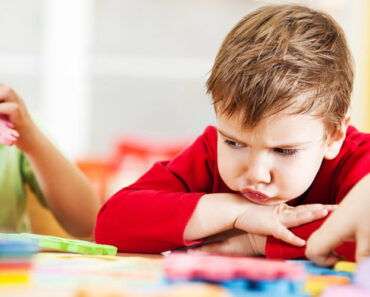We all want our kids to get As on their math and spelling tests. But helping your kids develop certain non-academic skills will better set them up for success—and it’s easier than it sounds.
We all want our children to do well in school. But as a Canadian neuroscientist and mom, I’m here to tell you that we need to look beyond the academic skills of reading, writing and math. Research has shown that children do well at school if they learn and practice four skills: creativity, flexibility, self-control and boundaries. It is these “executive functioning” skills that determine whether or not a child will succeed in school and life.
As parents, it may seem overwhelming (or impossible!) to try to teach our kids to “be creative” or “have boundaries,” but there are simple, research-backed activities you can do with your child to nurture these skills and help set them up for success in school and beyond.
1. Creativity: Open-ended arts
Instead of leading your child in a predetermined craft, such as making a drawing of a specific animal, set up an arts tray or table and add various arts and crafts supplies without giving your child any rules or instructions. You don’t have to fill it up, either—you can limit the choices and change it up every week.
Here are some materials you can include:
- Small pieces of construction paper
- Pictures or letters cut from magazines
- Pom poms
- Glue
- Tissue paper
- Empty rolls of toilet paper or paper towels
Your child will have plenty of opportunities to follow instructions in school, but having the space to play completely creatively will help them stretch the limits of their imagination and give them some confidence in their own ideas.
2. Flexibility: Pretend and risky play
You can practice flexibility with young children through pretend play. While playing pretend, your child might guide the situation. Every once in a while, switch up the plot to see how they respond to it. Do they adjust to your way or do they get upset? Either way, practice being curious about their response to the change and try to encourage some compromises.
Risky play is another great way to practice changing static thinking. If a child is jumping from one rock to another and realizes the next step will be too far, can they make a new plan without putting themselves at risk or becoming upset? Giving your child opportunities for creative problem-solving without your intervention helps foster flexibility.
3. Self-control of emotions: Parental modelling
Helping our children learn how to cope with their emotions is challenging since a large part of how they learn to navigate big feelings is about how we manage our own emotions. Use a variety of words to describe emotions, beyond simple ones like “mad” and “happy.”
In addition to teaching our children how to name emotions, we need to teach them how it feels to experience different feelings and what to do when they experience it. Think out loud when we experience an emotion. We can share with them when we are disappointed or frustrated and explain how we are coping with it.
By modelling, children will learn that it’s OK to have big feelings. They’ll also learn the vocabulary of emotion from us and observe our techniques for healthy emotional regulation.
4. Boundaries: Directions games
Boundaries tie into our inhibitions and impulses. For example, in school, kids have to learn to inhibit their impulses sometimes, such as running in the hallways, because of rules about safety. This idea is often hard for young children who cannot see the “big picture” of why they cannot act on their desires in the moment.
Work on boundaries through freeze games, stop and go games, or Simon Says, which are fantastic ways to practice boundaries which, in turn, can help your child follow rules a little more easily. Trusting an adult to “play by the rules” in a game can help kids understand how important it is to follow rules that aren’t part of games.
Next Steps: Useful resources
As a parent, it can feel overwhelming to know how to add these new skills into your life and how to teach your child. Luckily, many helpful resources exist that can support your family’s learning. As a Canadian neuroscientist (and mom), I’ve developed an app called Wondergrade, which is meant to help both you and your child learn and practice these critical skills at home while also learning general coping and emotional regulation tools. You could also join Curious Neuron, an online community of over 123,000 international parents who seek reliable and science-backed parenting resources including webinars, a blog, and a podcast with expert and celebrity guests.
Your child will learn plenty of facts and figures this upcoming school year, but they can also practice valuable social and emotional skills. With your help, they can experiment with creativity, flexibility, self-control and boundaries at home and at school in order to have a successful life, both in terms of learning academic facts and learning how to be a well-rounded and fulfilled person.

































